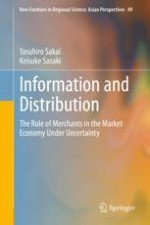2021 | OriginalPaper | Buchkapitel
2. The Role of Merchants in the Exchange Economy: A Historical Perspective
verfasst von : Yasuhiro Sakai, Keisuke Sasaki
Erschienen in: Information and Distribution
Verlag: Springer Singapore
Aktivieren Sie unsere intelligente Suche, um passende Fachinhalte oder Patente zu finden.
Wählen Sie Textabschnitte aus um mit Künstlicher Intelligenz passenden Patente zu finden. powered by
Markieren Sie Textabschnitte, um KI-gestützt weitere passende Inhalte zu finden. powered by
